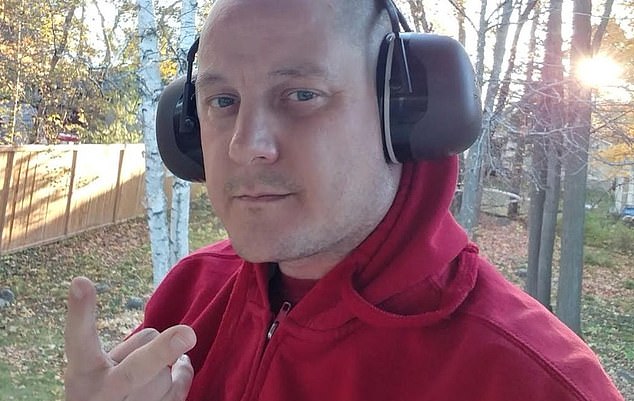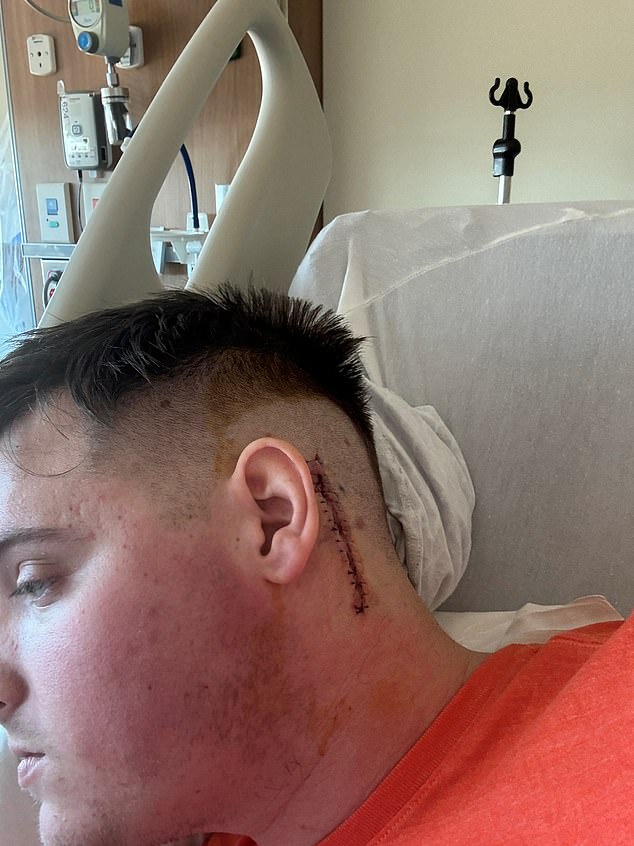David Vance beat stage 3 cancer and survived grueling chemotherapy and radiation treatments. But a rare hearing disorder became too much for him and he attempted suicide in 2018.
The 40-year-old, from Ontario, Canada, native now lives an isolated life with pain hyperacusis, an unusual condition for which there is no cure or treatment
It makes turning a page sounds like a bomb going off in someone’s ears. Music sounds like a ice pick to the eardrum; a siren like a rocket being launched from a mere foot away.
He wears industrial grade ear muffs when he leaves the house, but even in the comfort and silence of his own home, he is not spared from the pain. He said: ‘I have to go out in the world, I gotta face pain, face noise and facing noise and like going to war.’
Meanwhile Andrew Johnston, 25 from Texas, has just undergone experimental brain surgery in an attempt to make himself deaf, something that might not be doable due to risk of other nerves in the area.

Andrew Johnston, on left, said his pain hyperacusis was caused by extremely loud noise at a football game, and ‘mostly just a lot of bad luck’

David Vance has pain hyperacusis. To deal with the pain, he wears ear plugs under ear muffs when he leaves home
The noise of washing dishes and showering is painful. Even a mug being placed on a table produces unbearable pain.
Hyperacusis is considered rare, affecting one in every 50,000 persons.
There is no known cure or proven effective treatment for the condition.
Doctors may try benzodiazepines, which alleviate anxiety, or sound exposure therapy, which focuses on changing the emotional response to noise by continuously exposing the person to sounds.
Some people, including Mr Johnston, try acupuncture, which involves the insertion of very thin needles through the skin at strategic points on the body. While there is some evidence than acupuncture can be used to treat pain in the sinus area and ear canal, Mr Johnston said it didn’t work for him in the slightest.
The heightened sensitivity to sound is most commonly caused by an injury brought on by extremely loud sound exposure or a gradual degradation of the complex and delicate structure of the inner ear.
Mr Vance was an MC at electronic dance music concerts for 20 years, hyping up the crowd and making his own tracks.
He said: ‘I was constantly beside heavy bass and speakers for 20 years of my life and for like 15 of those years, like three to four times a week.’
All those years of exposure to extreme noise took its toll on his hearing.
Mr Johnston attributes his condition to a loud NFL game he attended two years ago. The pain from damage to his inner ear became so intense that he had to drop out of college with just a semester left and moved in with his parents who support him.
He said: ‘It’s not really something you can tough out. You just have to avoid all noise to keep the pain minimal.’
He described the pain like hot lava being poured into his ears. In exchanges with DailyMail.com, he said he had been considering surgically deafening himself ‘since the very first days of this stuff.’

Johnston underwent experimental surgery to deafen himself. Doctors at a Texas hospital sectioned the nervus intermedius, which provides pain sensation to the inner ear
‘There is just simply no point to living life with this condition.’
He made the radical decision to undergo a procedure to section off the cochlear nerve
He added: ‘I tried to rest in silence for two years and see if I would recover but I really only got worse. That’s why I’ve decided to experiment with surgeries.’
The surgery is both rare and experimental. Generally, surgeons perform procedures to improve a patient’s hearing loss, not complete it.
The cochlear nerve is the primary nerve responsible for transmitting auditory information from the cochlea, the organ of hearing in the inner ear, to the brain.
Doctors at a Texas hospital attempted to sever it, but couldn’t because of its close proximity to nerves responsible for balance and sense of taste.
Instead, they sectioned the nervus intermedius, which provides pain sensation to the inner ear.
‘Purely experimental,’ Mr Johnston said.
‘We will see if it works, if not I will do another surgery later this year to get the cochlear nerve,’ which will deafen him.
Mr Vance’s hearing trouble went into overdrive soon after he was diagnosed with non-hodgkin lymphoma in his chest in 2017 and began chemotherapy and radiation treatments.
One day, after completing a three-month treatment regimen and returning to work as a server in the fine dining industry, the din of the busy restaurant in Toronto, clanking glasses and dishes, became overwhelming. He decided to get professional help.
Finally, a doctor pinpointed the likely cause. Vance had to have teeth removed prior to starting chemo – a move to mitigate the risk of infection if the teeth are unhealthy.
But that procedure altered the positioning of his temporomandibular joints (TMJ), altering the position of which could potentially affect the surrounding structures and cause muscle tension in the jaw, which could potentially irritate nerves that are closely related to the auditory system, leading to heightened sensitivity to sound.
He said: ‘It was just an aching, burning pain at first and now what it feels like it’s just progressed over the years from medications that I’ve taken to try to help it and more noise traumas. So now it feels like I have like burning lava acid in my ears.
‘It could be burning one day, it could be aching. One day could feel like stabbing and my whole face and head goes up in pain as well, down my neck into my shoulders and it’s all burning and aching.
He added: ‘Any sounds ignite it. It could even be my coffee cup hitting the wooden table. It’ll just some shooting pain like into those areas.’
There is no cure, and there aren’t many treatments to choose from, either.
Dr Kimanh Nguyen, a Los Angeles-based otolaryngologist, told DailyMail.com: In terms of treatment, it’s difficult. If the hyperacusis becomes very bothersome, there’s [cognitive behavioral therapy] or tinnitus retraining therapies,’ which is a treatment process that trains your brain to become more accustomed to the ringing, roaring, or buzzing noises in the ears.
David Vance lives a largely isolated life. When he does need to leave the house, he wears ear plugs under thick ear muffs.
Meanwhile, Mr Johnston insists that deafness would be preferable to the daily excruciating pain of his condition, which he also likened to lava pouring into his ears.
He said: ‘I don’t really think living with the condition is an option. That’s why I’m trying to experiment with different things. Hopefully if I’m not able to find a breakthrough someone can build off of my data in the future and save themselves.’
One type of age-related damage is called superior canal dehiscence, which occurs when the bone sitting on top of the superior semicircular canal, one of the three fluid-filled canals in the inner ear that are important for balance and spatial orientation, becomes worn down with advancing age.
Hyperacusis could also arise from damage to the auditory nerve, which runs between the ear and the brain.









